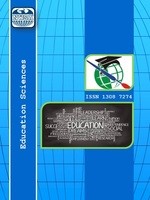6.SINIF FEN VE TEKNOLOJİ DERSİ “CANLILARDA ÜREME, BÜYÜME VE GELİŞME” ÜNİTESİNİN İŞBİRLİKLİ ÖĞRENMEYLE (JİGSAW TEKNİĞİ) ÖĞRETİMİNİN ÖĞRENCİ BAŞARISINA ETKİSİ
Bu araştırma; işbirlikli öğrenme yönteminin Fen ve Teknoloji dersinde başarı ve kalıcı öğrenmeye etkisini geleneksel öğrenme yöntemine kıyasla değerlendirmek amacıyla gerçekleştirilmiştir. Araştırmada, kontrol gruplu ön test-son test deney deseni kullanılmıştır. Bu araştırmada 35 çoktan seçmeli sorudan oluşan Fen ve Teknoloji başarı testi kullanılmıştır. Bu test ayrıca hatırlama testi olarak kullanılmıştır. Test sonucunda elde edilen verilerin çözümlenmesinde “t” testi uygulanmıştır. Kontrol ve deney grubunun başarı son testleri için yapılan ilişkisiz grup “t” testinde deney grubu lehine istatistiksel açıdan anlamlı bir farklılık bulunmuştur. Ayrıca Fen ve Teknoloji başarı testi, hatırlama testi olarak da kullanılmıştır. Kontrol ve deney grubunun başarı hatırlama testleri için yapılan ilişkisiz grup “t” testinde, deney grubu lehine istatistiksel açıdan anlamlı bir farklılık bulunmaktadır. Araştırma sonucunda, işbirlikli öğrenmenin Jigsaw tekniğinin Fen ve Teknoloji dersinde başarıya etkisinin olumlu olduğu belirlenmiştir. Ayrıca işbirlikli öğrenme yönteminin kalıcı öğrenme üzerinde de etkili olduğu tespit edilmiştir.
Anahtar Kelimeler:
Fen ve Teknoloji, İşbirlikli Öğrenme, Jigsaw Tekniği, Başarı
THE EFFECTS OF TEACHING WITH COOPERATIVE LEARNING OF UNIT OF REPRODUCTION ON LIVINGS ON ACHIEVEMENT IN SCIENCE LESSON
This research has been made in order to evaluate the effect of cooperative learning on achievement and retention in Science and Technology teaching. In this research, pretest and posttest experiment design with control groups has been applied. In this research, "Science Success Test" including 35 multiple choice questions has been used in order to gather data. The test has been used as pretest-postest-delayed postest. Independent and paired groups "t" tests were used to analyze the data. A meaningful difference has been obtained in favour of experiment group at achievement posttest which has been applied for control and experiment groups using independent "t" test. In addition Science Success Test has been used as delayed postest. A meaningful difference has been obtained in favour of experiment group at achievement delayed posttest which has been applied for control and experiment groups using independent "t" test. As a result the study it was seen that jigsaw technique of cooperative learning approach has had positive effects on achievement and retention in Science and Technology teaching. In addition, it has been found that cooperative learning more effective on retention.
Keywords:
Science and Technology, Cooperative Learning Jigsaw Technique, Academic Success, Primery, ,
- Başlangıç: 2009
- Yayıncı: E-Journal of New World Sciences Academy
Sayıdaki Diğer Makaleler
ÖĞRETİM ELEMANLARININ ZAMAN YÖNETİMİNDE BİLGİSAYARI KULLANMA DÜZEYLERİ
MYROBOT: KABLOSUZ KONTROL EDILEBILEN MOBIL ARAŞTIRMA ROBOTU
OKUMA YAZMA ÖĞRETİMİNDE ÖZEL BİR YÖNTEM: SES ODAKLI DİL ÖĞRETİM YÖNTEMİ
SINIF ÖĞRETMENLİĞİ ÖĞRENCİLERİNİN ALGILARINA GÖRE KENDİ SINIF YÖNETİMİ YETERLİK DÜZEYLERİ
İbrahim TERCAN, Senem SAKARYA, Ahmet Naci ÇOKLAR
REHBER ÖĞRETMENLERİN; İNTERNETE YÖNELİK REHBERLİK AÇISINDAN YETERLİKLERİNİN DEĞERLENDİRİLMESİ
